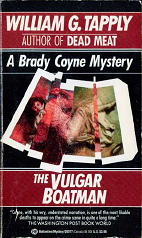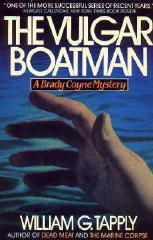Thu 14 May 2009
WILLIAM G. TAPPLY – The Vulgar Boatman. Ballantine, paperback reprint; 1st printing, September 1989. Hardcover edition: Charles Scribner’s Sons, 1987.

This is the sixth of William Tapply’s series of Brady Coyne adventures, a series that last year reached 24 in number, which is a fairly spectacular record, nor do I think he (or either of them) is going to being retiring soon. Reviewed previously on this blog have been Cutter’s Run (1998) by me, and The Dutch Blue Error (1984), a 1001 Midnights review by Kate Mattes.
Part of Tapply’s success as an author is a smooth writing style that’s just as adept in descriptive passages – sights and sounds in and around the Boston area – as it is in dialogue, which as real as it gets without having a tape recorder in your pocket.
People come to life immediately in Tapply’s hands, in other words, in just a few broad strokes at first, then some much more finely drawn ones. The way they talk and act is a great part of what makes the Brady Coyne books so entertaining and read so quickly.
In The Vulgar Boatman, Coyne is hired by a good friend who happens to be running for governor, and whose son is missing after the son’s girl friend has been found murdered. This is not good news for Tom Baron’s gubernatorial aspirations, of course. Coyne, not wishing to get drawn into politics, agrees to help, but only on a personal basis.

Both Tom’s son and the girl friend were high school students, and the easy availability of drugs, even in a small suburban town, and crack in particular, soon becomes part of the case.
I do not use the latter word to suggest that this is a detective novel, however. This is a crime novel, it’s a thriller, but a work of detective fiction, it’s not. While there are clues to follow up on, detective work is not in Brady Coyne’s arsenal of expertise.
He blunders along and stirs things up, gets into trouble himself (from several quarters) and before you know it, the book is over, more or less happily. There are, however, three separate points in the story where Coyne fails as a detective. Well, let’s call the first instance a D Minus, but the other two are F’s for sure.
I’d enumerate them in detail, but I’d have to reveal too much for the purposes of a mere review. I’d also be criticizing the book for what I’d want it to be, and not necessarily for the author’s failed intentions. Nor am I suggesting that you not read the book, as I enjoyed it anyway, and I think you might very well do so too.
August 3rd, 2009 at 8:03 pm
[…] The Vulgar Boatman The Dutch Blue Errror Cutter’s Run […]